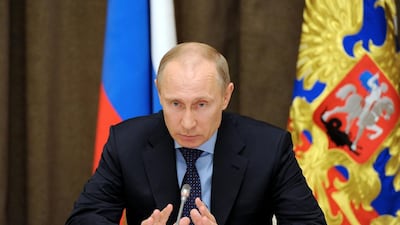Vladimir Putin has told the United States it will have to cut its embassy and consulate staff in Russia by 755 under new sanctions from Moscow.
The U.S. Embassy has been ordered to limit the number of embassy and consular employees in the country to 455, in response to the U.S. Senate's approval of a new package of sanctions.
Russia's Foreign Ministry on Friday ordered a reduction by September 1 in the number of U.S. diplomatic personnel in Russia.
In an interview televised on Russian television, Putin explained why Moscow decided to retaliate.
He said: "We had hoped that the situation will somehow change, but apparently if it changes, it won't be soon.
"I thought it was the time to show that we're not going to leave it without an answer."
He added that while Russia is open to cooperating with the U.S. on various issues, including terrorism and cybercrime, it "only hears unfounded accusations of meddling in U.S. domestic affairs" instead.
Putin said more than 1,000 people are currently employed at the Moscow embassy and three U.S. consulates in Russia. They include both Americans and Russians hired to work in the diplomatic offices.
The Russian leader did not explain how the figure of 755 positions was calculated.
The State Department declined to give an exact number of American diplomats or other U.S. officials in Russia, but the figure is believed to be about 400, some of whom have families accompanying them on diplomatic passports.
The vast majority of the more than 1,000 employees at the various US diplomatic missions in Russia, including the embassy in Moscow and consulates in St. Petersburg, Vladivostok and Yekaterinburg, are local employees.
Asked about the potential for additional sanctions against Washington, Putin described the reduction in diplomatic staff as "painful" and said he currently opposes further measures.
"We certainly have something to respond with and restrict those areas of joint cooperation that will be painful for the American side but I don't think we need to do it," he said, adding that such steps could also harm Russian interests.
The diplomatic tit-for-tat started under former U.S. President Barack Obama. In response to reports of Russian meddling in the 2016 presidential election, Obama ordered the expulsion of 35 Russian diplomats and shut down two Russian recreational retreats in the U.S.

